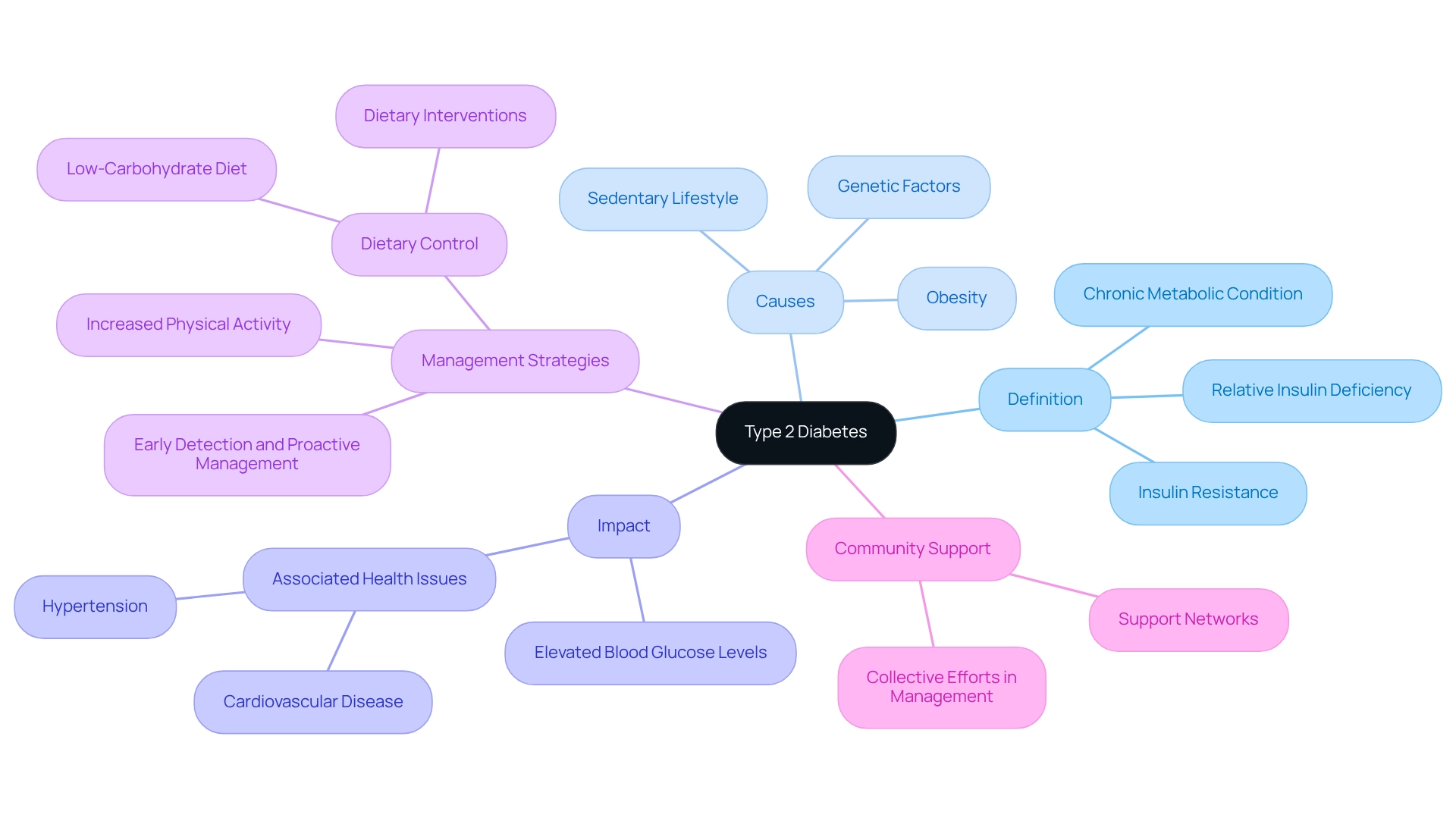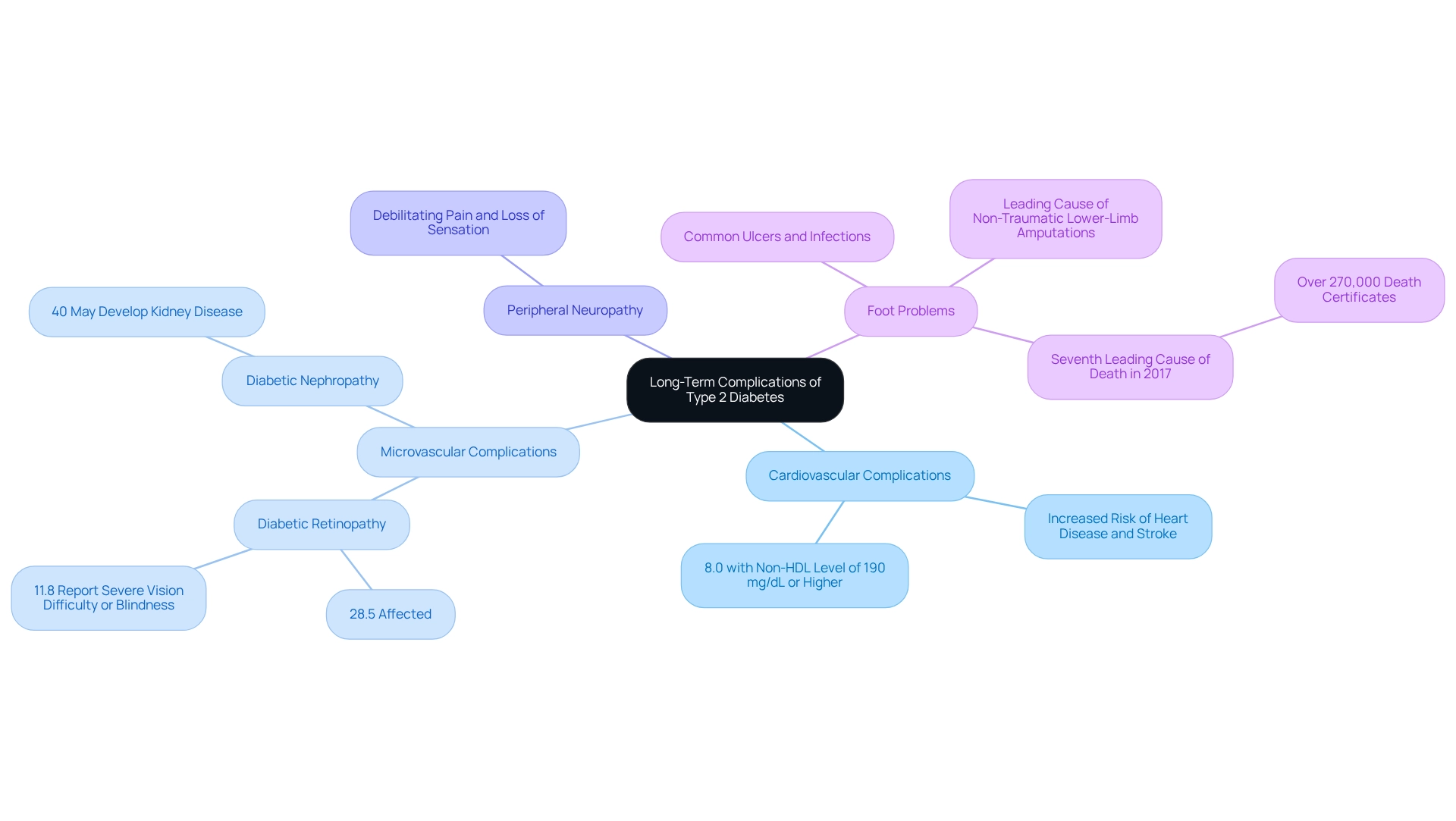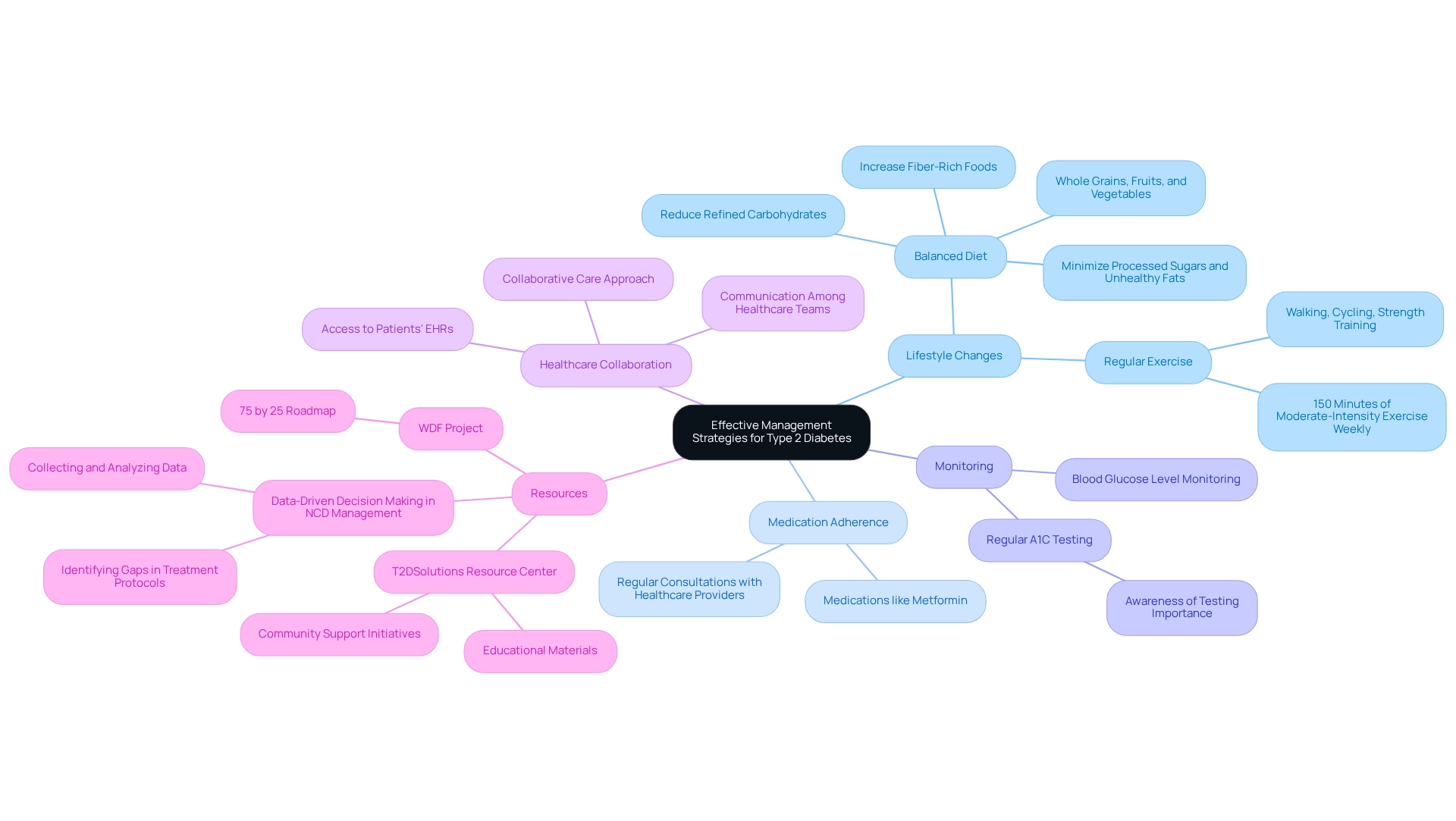Overview
Type 2 diabetes can significantly impact your health, leading to serious complications such as cardiovascular disease, neuropathy, and kidney disease. These conditions can profoundly affect your quality of life. It's understandable to feel overwhelmed by this diagnosis, but there is hope.
Proactive management strategies are essential. Embracing lifestyle changes and consistent monitoring can help mitigate these effects and improve your overall health outcomes. You're not alone in this journey—many individuals are navigating similar challenges.
We encourage you to seek support and resources tailored to your needs. Remember, taking these steps can lead to a healthier, more fulfilling life. Together, we can face these challenges and work toward better health.
Introduction
Type 2 Diabetes has emerged as a pressing global health concern, affecting millions and presenting significant challenges for individuals and healthcare systems alike. It's understandable to feel overwhelmed by this diagnosis. Characterized by insulin resistance and elevated blood glucose levels, this chronic condition often develops gradually and is closely linked to lifestyle factors such as obesity and inactivity. As the prevalence of Type 2 Diabetes continues to rise, understanding its complexities—from the far-reaching health impacts to effective management strategies—becomes increasingly vital.
You're not alone in this journey. With expert insights and the latest research highlighting the importance of proactive care and community support, individuals can empower themselves to navigate their health journey. Together, we can mitigate the risks associated with this condition and foster a supportive environment where everyone feels heard and understood. Remember, we are here to support you every step of the way.
Define Type 2 Diabetes: Understanding the Condition
Type 2 Diabetes is a chronic metabolic condition that affects many individuals, characterized by insulin resistance and a relative deficiency of insulin. This leads to elevated blood glucose levels. Unlike Type 1, where the pancreas produces little to no insulin, those with Type 2 can produce insulin, but their bodies struggle to use it effectively. This condition often develops gradually and is commonly associated with obesity, a sedentary lifestyle, and genetic factors.
Currently, around 537 million adults worldwide are living with Type 2 Diabetes, which accounts for about 90% of all diabetes cases. The prevalence of this condition is on the rise, particularly in populations facing high obesity rates. Recent studies highlight the critical role of insulin resistance in the progression of Type 2 Diabetes, showing that lifestyle changes—like dietary adjustments and increased physical activity—can significantly improve insulin sensitivity.
For example, research led by Dr. Barbara Gower has shown that dietary interventions, especially low-carbohydrate diets, may enhance beta-cell function and even lead to remission for some individuals with mild cases of Type 2. This underscores the potential of dietary control as a valuable treatment option.
Experts emphasize that understanding the characteristics of Type 2 Diabetes is crucial for effective management. Benjamin Renquist, an associate professor at the UArizona College of Agriculture and Life Sciences, notes, "The scale of the obesity crisis renders these promising findings a significant initial step that we hope will ultimately influence the well-being of our family, friends, and community." Additionally, it’s important to recognize that the effects of type 2 diabetes are often linked with other health issues, such as cardiovascular disease and hypertension, making comprehensive care essential. By identifying the signs and symptoms early, individuals can take proactive steps toward managing their health.
In summary, having a thorough understanding of Type 2 Diabetes—including its definition, characteristics, and the impact of insulin resistance—is vital for newly diagnosed patients. This knowledge empowers individuals to make informed choices about their health and engage in effective management strategies. At T2DSolutions, we believe that enhanced wellness outcomes can arise from collective efforts in diabetes management, highlighting the importance of community support. Remember, you're not alone in this journey; we are here to support you every step of the way.

Explore the Effects of Type 2 Diabetes on Health
Explore the type 2 diabetes effects on health, as type 2 diabetes significantly impacts overall health, affecting various organ systems and leading to serious complications. Among the most prevalent issues are:
- Cardiovascular disease
- Nerve damage (neuropathy)
- Kidney disease (nephropathy)
- Eye complications (retinopathy)
Elevated blood sugar levels contribute to inflammation and vascular damage, heightening the risk of heart attacks and strokes. It's concerning that individuals with Type 2 diabetes mellitus are two to four times more likely to develop cardiovascular diseases compared to those without the condition.
Neuropathy is another common complication. Prolonged high blood sugar levels can damage nerves, particularly in the extremities, leading to pain, tingling, or loss of sensation. This nerve damage can severely affect mobility and quality of life. Additionally, kidney disease, or nephropathy, is a major issue, as it can advance to end-stage renal disease, requiring dialysis or transplantation.
The psychological impacts are also considerable. Many individuals with Type 2 diabetes face anxiety and depression, arising from the continuous demands of the condition. Recent findings indicate that almost 30% of patients report symptoms of depression, which can further complicate the management of blood sugar levels and exacerbate type 2 diabetes effects on overall wellness outcomes. Experts emphasize the importance of addressing these wellness effects proactively. Cardiologists stress that managing blood sugar levels is crucial not only for diabetes control but also for reducing cardiovascular risks. As Richard E. Pratley, MD, observes, progress in treatment alternatives offers optimism for patients, highlighting the necessity for thorough care strategies that include both physical and mental well-being. This is especially significant as over 80 nations have adopted strategies to decrease sugar-sweetened drink intake, demonstrating a worldwide acknowledgment of the necessity to address diabetes-related concerns.
Real-life instances showcase the serious repercussions of uncontrolled Type 2 diabetes. For example, a case study of a patient who overlooked their condition showed that they encountered severe complications, emphasizing the importance of education and support in effective disease care. Statistics indicate that patients who do not follow management strategies often experience significant declines in well-being, underscoring the importance of proactive care.
At T2DSolutions, we strive to be your all-encompassing resource for diabetes education and community support. Understanding the multifaceted type 2 diabetes effects is essential for both patients and healthcare providers, enabling the implementation of effective monitoring and intervention strategies that can significantly improve health outcomes. You're not alone in this journey; explore our resources to learn more about managing Type 2 conditions effectively.
![]()
Identify Long-Term Complications of Type 2 Diabetes
The long-term complications of type 2 diabetes effects can be severe and significantly impact your quality of life. It's important to understand that among the most critical issues are cardiovascular complications, such as heart disease and stroke, which are prevalent in this population. Research indicates that individuals with this condition face a heightened risk for these issues, with cardiovascular disease being a leading cause of morbidity and mortality. Significantly, 8.0% of adults with diagnosed health issues related to blood sugar have a non-HDL level of 190 mg/dL or higher, further illustrating the cardiovascular risks linked to this condition.
Microvascular complications are also a major concern. Diabetic retinopathy, which can lead to significant vision loss or blindness, affects around 28.5% of adults with diagnosed blood sugar issues. Alarmingly, 11.8% of US adults aged 18 years or older with a diabetes diagnosis reported severe vision difficulty or blindness. This highlights the necessity for regular eye examinations and proactive management strategies to address the type 2 diabetes effects. Similarly, diabetic nephropathy presents a considerable threat, with recent statistics indicating that approximately 40% of people with the condition may develop kidney disease, potentially leading to kidney failure.
Peripheral neuropathy is another complication that can cause debilitating pain and loss of sensation in the extremities, increasing the likelihood of injuries and infections. Foot problems, including ulcers and infections, are common and can result in amputations if not properly managed. In fact, this condition is a leading cause of non-traumatic lower-limb amputations in the United States. It was also the seventh leading cause of death in the U.S. in 2017, being listed as the underlying or contributing cause of death on over 270,000 death certificates.
Recognizing the complications and type 2 diabetes effects emphasizes the essential need for proactive oversight, including regular medical check-ups and lifestyle adjustments. As YLiu emphasizes, "There is an urgent need for enhancing the management level of patients with diabetes and driving optimization of the healthcare system." By understanding these potential complications, you're taking informed steps towards better health outcomes. Remember, you’re not alone in this journey. T2DSolutions promotes a holistic approach that includes community support and lifestyle changes, and we are here to support you every step of the way.

Implement Effective Management Strategies for Type 2 Diabetes
Managing type 2 diabetes effects effectively requires a holistic approach that encompasses lifestyle changes, medication adherence, and consistent monitoring of blood glucose levels. It's understandable to feel overwhelmed, but know that there are key strategies you can adopt to help you on this journey. Emphasizing a balanced diet rich in whole grains, fruits, and vegetables while minimizing processed sugars and unhealthy fats can make a significant difference. Many individuals have reported improvements in their blood sugar control by incorporating more fiber-rich foods and reducing their intake of refined carbohydrates.
Regular physical activity, such as walking, cycling, or engaging in strength training, plays a crucial role in maintaining a healthy weight and enhancing insulin sensitivity. The latest dietary guidelines suggest striving for at least 150 minutes of moderate-intensity exercise each week. This commitment can lead to improved control of blood glucose levels, and you're not alone in this effort.
Medications, including metformin, are often prescribed to help regulate blood sugar levels. It's essential for you to have regular consultations with your healthcare providers to tailor treatment plans that suit your needs and address any emerging health concerns. Statistics show that up to 22% of patients may not realize the importance of regular A1C testing, which is vital for monitoring long-term glucose control. Regular monitoring is crucial, as it helps in adjusting treatment plans effectively and preventing complications related to type 2 diabetes effects.
Including expert guidance, nutritionists highlight the significance of meal planning and portion control as effective strategies. Sandra Leal, PharmD, MPH, FAPhA, emphasizes the collaborative approach essential for effective diabetes care, stating, "As a pharmacist, what we try to do is work together closely with other providers..." This underscores the importance of communication among healthcare teams in supporting you through this process.
T2DSolutions acts as a valuable resource center for newly diagnosed patients, providing educational materials and community support initiatives that can assist you in applying these effective handling strategies. Real-life case studies demonstrate that individuals who actively engage in dietary changes and physical activity report improved health outcomes and a reduced risk of type 2 diabetes effects. For instance, the initiative named "Data-Driven Decision Making in NCD Management" illustrates how gathering and examining information can aid in decision-making and innovation in healthcare delivery for managing blood sugar conditions.
Furthermore, the WDF project seeks to assist 75 million individuals with blood sugar conditions and hypertension by 2025, emphasizing the joint efforts in managing healthcare. By embracing these strategies and utilizing the resources available through T2DSolutions, you can significantly enhance your quality of life while effectively managing the effects of type 2 diabetes. Remember, ongoing initiatives to increase government funding for non-communicable diseases (NCDs) will improve healthcare infrastructure and services, further supporting your diabetes management efforts.

Conclusion
Type 2 Diabetes is a complex and multifaceted condition that requires a comprehensive understanding for effective management. It’s important to recognize the significance of insulin resistance and the lifestyle factors that contribute to this disease. With approximately 537 million adults affected globally, the urgency to address this health crisis cannot be overstated. Effective management strategies, including:
- Dietary changes
- Increased physical activity
- Medication adherence
are essential for improving health outcomes and reducing the risk of serious complications.
The impact of Type 2 Diabetes extends beyond mere blood sugar levels; it encompasses a range of health issues, including:
- Cardiovascular disease
- Neuropathy
- Kidney complications
The psychological burden, often overlooked, further complicates the management of this condition. It's understandable to feel overwhelmed, but proactive care and community support play a vital role in empowering individuals to take charge of their health, mitigate risks, and foster a supportive environment.
Ultimately, the journey of managing Type 2 Diabetes is not faced alone. By leveraging available resources, engaging in lifestyle modifications, and maintaining open communication with healthcare providers, individuals can navigate their health journey more effectively. You’re not alone in this journey; we are here to support you every step of the way. It is essential to embrace a holistic approach that prioritizes both physical and mental well-being, ensuring that those living with Type 2 Diabetes can lead fulfilling lives while managing their condition.
Frequently Asked Questions
What is Type 2 Diabetes?
Type 2 Diabetes is a chronic metabolic condition characterized by insulin resistance and a relative deficiency of insulin, leading to elevated blood glucose levels.
How does Type 2 Diabetes differ from Type 1 Diabetes?
Unlike Type 1 Diabetes, where the pancreas produces little to no insulin, individuals with Type 2 Diabetes can produce insulin but struggle to use it effectively.
What are the common causes of Type 2 Diabetes?
Type 2 Diabetes often develops gradually and is commonly associated with obesity, a sedentary lifestyle, and genetic factors.
How prevalent is Type 2 Diabetes worldwide?
Currently, around 537 million adults worldwide are living with Type 2 Diabetes, accounting for about 90% of all diabetes cases.
What role does insulin resistance play in Type 2 Diabetes?
Insulin resistance is critical in the progression of Type 2 Diabetes, and lifestyle changes such as dietary adjustments and increased physical activity can significantly improve insulin sensitivity.
What dietary interventions may benefit individuals with Type 2 Diabetes?
Research suggests that low-carbohydrate diets may enhance beta-cell function and possibly lead to remission for some individuals with mild cases of Type 2 Diabetes.
Why is understanding Type 2 Diabetes important for management?
A thorough understanding of Type 2 Diabetes, including its characteristics and the impact of insulin resistance, empowers newly diagnosed patients to make informed health choices and engage in effective management strategies.
What other health issues are linked to Type 2 Diabetes?
The effects of Type 2 Diabetes are often associated with other health issues such as cardiovascular disease and hypertension, making comprehensive care essential.
How can individuals take proactive steps in managing their health regarding Type 2 Diabetes?
By identifying the signs and symptoms early, individuals can take proactive steps toward managing their health effectively.
What support is available for those managing Type 2 Diabetes?
Community support is emphasized as vital in diabetes management, and organizations like T2DSolutions offer assistance to individuals on their journey with Type 2 Diabetes.



